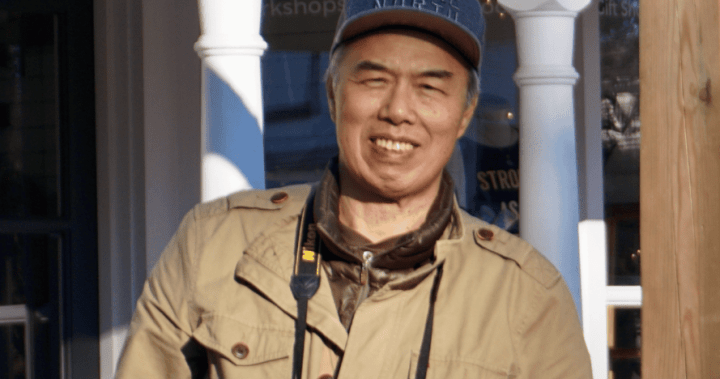Venture Academy’s Kelowna campus, pictured here in the top left, was based out of the historic Black Mountain Schoolhouse. Since the location was shut down, it has become a liquor store.
Global News / Venture Academy Website


Eleven years ago, Alison* says the person charged with her care crossed a line that altered her life – and she’s been living in the shadow of the trauma ever since.
At 16, Alison, whose name has been changed to protect her identity, stepped off a plane in Kelowna, B.C., to attend a residential treatment facility. Marketed as “Canada’s leading program for struggling teens,” Venture Academy looked idyllic; a crimson clapboard farmhouse nestled among rolling fields, and a residential program that houses teens with local families, known as host parents. She’d agreed to attend at her mother’s behest – her home life was unsafe, she says, but she isn’t comfortable saying why.
Instead, Alison says she found herself in another place where safety was promised, but never delivered.
“I wouldn’t have gotten on that plane if I knew what I was getting into,” she tells Global News.
Because, according to Alison, what once felt like a chance at a clean slate began to shift — subtly at first, then unmistakably.
Alison was allegedly sexually abused by her male host parent, one of four underage girls who say they were abused or assaulted by men who became their carers while attending the program, according to court documents and a six-month-long investigation by Global News.
Global News / Venture Academy Website
Since launching in Kelowna in 2001, Venture has opened two further locations, one near Red Deer, Alta., and another near Barrie, Ont. The company vows to address everything from family conflict, drug and alcohol use, mental health issues, to smartphone addiction. Its Kelowna location shuttered in 2021 for undisclosed reasons.
Host parents are employed as contractors for Venture, providing housing for teens throughout their stay. They are also responsible for transporting attendees to and from the campus, preparing meals and providing day-to-day care for youth.
Global News’ investigation involved interviews with about 70 alumni, parents, staff and host parents across Venture’s three locations and an analysis of hundreds of pages of court and child welfare documents, uncovering a program that, some say, inflicted psychological and emotional harm under the guise of therapeutic rehabilitation. It also found a residential program that appears to operate with scarce training and little oversight.
“When questions were brought up (about host parents’ behaviour), the answer was, ‘We need host parents,’” says one former staffer at Venture’s Ontario campus, who asked not to be named for fear of repercussions.
Former attendees are seeking accountability in courtrooms.
Three cases, and at least one police investigation referring to two complainants, allege that sexual abuse or assault was committed by male host parents housing underage girls for Venture. One of them has resulted in a criminal conviction.
Alison’s wasn’t that case. Now aged 27, she filed a civil court case in January against her former host parent, his wife, and Venture Academy, suing for a sum they’ve yet to determine. The case alleges that Venture knew, or ought to have known, about the abuse, and that it was “concealed … to avoid scandal.”
“It ruined my life … and I’m still working to this day to try to get the pieces back from that incident,” Alison says.
Venture did not serve its defence within the three-week period set out in the court rules, which is not uncommon for lawsuits.
Global News
Court documents allege that the abuse began when her 27-year-old host father began entering her room unannounced after she’d showered and was changing, and making sexual jokes about her. He allegedly provided her with alcohol and cigarettes and took explicit photos of her and another Venture teen. Then, the suit alleges, he was lying on her bed and “touching, cuddling and kissing her,” before things escalated to sexual intercourse between 50 and 100 times over six weeks.
Global is not naming the host parents referred to in this story, because doing so could reveal their victims’ identities, which are protected by publication bans.
Alison remained with the program for two months, and subsequently reported the abuse allegations to police within a year of leaving,
A Kelowna RCMP investigation took six years before an arrest was made. Of the six charges the man initially faced, there was one conviction, but it related to the sexual exploitation of another underage Venture youth.
“It truly does affect you forever. It doesn’t just go away.”
Venture declined to answer all questions from Global News, citing “reasons of confidentiality and privacy.”
It did, however, provide a statement that described itself as a “lifeline for youth and families in crisis.”
“(Our) locations reinforce our commitment to safety, quality, and responsive care,” the statement says.
Almost a decade after Alison’s experience at Venture, the company’s oversight of host parents remains a concern with the province and the local children’s aid society. Documents obtained by Global News from recent inspections from 2024 and 2025 on the Venture Ontario campus, conducted by the Ministry of Children, Community and Social Services (MCCSS), and a 2020 child protection investigation by Simcoe Muskoka Family Connexions (SMFC) both outline ongoing concerns with host parent vetting, evaluation and training.
Global News
“There is no minimum standard for capacity, qualification, training and education for staff and host parents, which impacts the quality of care,” a 2020 letter from SMFC to Venture’s founder Gordon Hay reads.
But an expert interviewed by Global News believes, based on the testimonies of alumni and staff, that the way residential programs such as Venture’s operate can open the door to abuse. It’s reminiscent of the U.S.’s troubled teen industry (TTI), which is currently amid a reckoning over abuse allegations.
“These kinds of programs are so exploitable by people who are looking to sexually abuse children,” says U.K.-based researcher Sarah Golightley, who has spent nearly a decade examining the troubled teen industry in the U.S.
Young people with mental health problems in these programs are often seen to be “crazy,” she says, and because staff and parents have been primed not to believe them, any teen who comes forward with complaints of sexual abuse can expect not to be believed.
That was the environment, teens and staff say, that was entrenched at Venture.
Venture Academy operates three for-profit treatment centres for struggling youth – the first month can cost families more than $15,000, and it’s about $10,000 for every month after that. It’s an option many families turn to as the public health system struggles with the rise of teen anxiety and depression, and skyrocketing wait times for publicly funded treatments.
Alison recalls being “tricked” into attending Venture by her mother, who she says described it as a boarding school. She disembarked her flight in Kelowna, recalling it was “sunny.”
But her experience, she says, soon turned dark.
According to allegations in her lawsuit, Alison was living with a young host couple when the abuse began. Two months prior, another Venture student was allegedly removed from that home by Venture, because there was a concern from the girl’s parents and staff that their daughter was “too close” with the host father.
After two weeks of the man “grooming” Alison, according to court documents, Alison and the host father began having sexual intercourse. The man said if she told anyone, he would go to jail and his “children would suffer, according to allegations in court documents.
The man’s wife discovered the abuse after a few weeks but “took no steps to stop or report (it),” court documents say.
Eventually, Venture asked Alison to leave the program because her behaviour was worsening, court documents allege. When Global asked her to elaborate on what happened, she declined.
The company continued to house other underage girls in the man’s home and did not terminate his employment until months later, in August 2014, court documents say. Venture allegedly did not report the sexual abuse to police.
Because of the sexual abuse, Alison was so scared she would be sent to another residential treatment program that she ran away and lived unhoused for about six to 12 months, court documents say. During this time, Alison says she was subjected to further sexual assaults and became pregnant.
In April 2015, Alison reported the alleged abuse to police, Kelowna RCMP confirmed to Global News. But the former host parent wasn’t arrested until six years later, in Peterborough, Ont. Kelowna RCMP wouldn’t elaborate on why the arrest took six years, except to say it followed an “extensive investigation.”
The former host parent faced two counts of sexual exploitation and one count of sexual assault in relation to Alison, and two counts of sexual exploitation and one count of sexual assault against another Venture youth.
In April 2022, he pleaded guilty to one count of sexual touching with respect to the unnamed complainant, while the rest of the charges were stayed. He was sentenced to 28 months in prison, ordered to register on the national sex offender registry for 10 years, and released from prison in October 2024.
The host parent’s Parole Board decision highlighted similarities with allegations in Alison’s case. He plied his victim with alcohol and cigarettes and groomed her to the point that the sexual offending occurred two or three times per week, according to the decision. The man’s wife found them in bed naked together, the documents state, but she did not report the behaviour to police until 18 months later.
DD
In a victim impact statement, referenced in the Parole Board decision, the girl said she was so embarrassed by the “mental anguish” of the assaults that she began cutting herself and attempted suicide by drug overdose.
“Reports indicate you also abused another victim under similar circumstances but were not convicted; you dispute this information and any relationship with a second victim,” the decision states.
Alison’s lawsuit lists 14 mental health issues she says she has been left with, including complex post-traumatic stress disorder, an eating disorder, paranoia and chronic pain.
“(The abuse) changed who I was as a person,” she tells Global News.
“It truly does affect you forever. It doesn’t just go away.”
The host parent declined to answer questions from Global News, stating, “I can deal with this privately.” He also said he had not yet been “served anything,” and the address noted on Alison’s lawsuit is wrong.
Venture did not respond to detailed questions about the case.
Looking back now, Alison says she was too young and vulnerable to know she was being groomed.
“A whole range of adults failed, not only me, but other kids in the program as well.”
In July 2016, another lawsuit was filed against Venture involving Kelowna host parents.
According to allegations in those court documents, a host father repeatedly sexually assaulted a 15-year-old girl in 2010. The incidents happened in the early mornings in her bedroom while the host mother was out of the house, court documents allege. The man allegedly fondled the young girl’s buttocks and legs, hugged her intimately, used sexually suggestive bodily contact and made sexually threatening comments.
Both Venture and the host parents filed defences denying the allegations of sexual assault and sexual exploitation of a minor.
The sexual assault allegations came after the girls’ parents sued Venture Academy and its founder, Gordon Hay, in a separate lawsuit in 2011, seeking damages for breach of contract, fraudulent and negligent misrepresentation, and breach of fiduciary duty. Venture and Hay denied the allegations, and a year later, the case was settled.
Then, in 2013, Venture sued the girl and her mother for defamation, claiming they “embarked on a campaign to undermine Venture.” In doing so, Venture says the mother breached a 2012 settlement agreement, which included non-disparagement clauses. Both the girl and her mother denied the allegations.
Global attempted to contact the mother and daughter to ask them about their experience at Venture, but was unsuccessful.
Read Part 1 of Global’s investigation into Venture Academy
In 2022, a year after the Kelowna campus closed, Venture argued that the case involving sexual assault should be dismissed and that it should not be held liable. Part of its argument rested on the claim that the host father, now facing health issues, was unfit to testify.
Shortly after, the girl filed to have the case dismissed without costs. Venture agreed, and the case was dismissed on March 30, 2022. The defamation lawsuit is ongoing.
Global News uncovered another court case involving Venture, relating to its Barrie campus. In February 2014, a Toronto couple sued the Ontario branch of the company for $100,000, saying their 14-year-old daughter was sexually assaulted.
According to allegations in Ontario court documents, the girl attended Venture in 2011 and was treated as an “individual of sexual interest” to her male host parent, who made sexual comments and gestures of a sexual nature to her, as well as appearing around her in a state of partial undress.
That behaviour escalated to sexual assault when the man forcibly groped her, the documents allege.
About four months into her stay, Venture Academy transferred the girl to another host parent’s house, characterizing it as “standard procedure,” according to court documents. The couple removed their daughter from the program, the documents say, and reported the host parent’s conduct to the police. The couple declined to speak to Global News through their lawyer. A source close to the case said it was settled.
Monthly payments for host parents, according to a Venture job listing from late May, start at $2,100, and the only qualifications necessary appear to be a valid driver’s licence, Level 1 first aid, and a criminal record check with a vulnerable sector search.
Venture declined to comment on its vetting processes.
But child welfare authorities in Ontario have repeatedly raised concerns about aspects of the host parent program.
In 2020, SMFC’s child protection investigation found that Venture’s host parents were not always prepared or enabled to support youth with mental health issues, substance abuse, concurrent disorders, fetal alcohol spectrum disorder and/or complex trauma.
Five of the investigation’s 26 recommendations referred to the management of host parents, urging Venture to ensure adequate training and support and to ensure they all have child welfare, criminal background and vulnerable sector checks.
But problems with the residential program continued. A 2022 report by MCCSS’s investigations and enforcement unit found that four of the eight files examined by investigators did not have the required evidence that police record checks were completed, and three did not include a foster parent assessment conducted by Venture.
In 2024, MCCSS’s licensing report alleged that Venture’s host parent files lacked evidence that training requirements were met. In 2025, a child’s file lacked a host parent’s approval to even be a host parent, according to the report.
MCCSS would not answer specific questions about these reports.
Krista Hessey / Global News
Lise Milne, a social work professor at the University of Regina and the research chair for the Child Trauma Research Center, says the perceived lack of oversight of Venture’s residential program, based on allegations from staff and host parents, could have allowed abuse to occur.
“This results in these types of abuse situations occurring more prominently, especially when there’s no oversight, especially when a child does not have the channels to speak about what’s happened to them,” Milne says.
Milne says that because child sexual abuse has so much shame associated with it, many children do not disclose allegations until adulthood, which she believes is why so many cases go unreported.
Based on allegations from Venture alumni and staff, Golightly draws a parallel between Venture and companies operating in the TTI in the U.S. – an area that has faced growing scrutiny, prompting Senate committee reports, documentaries, and the establishment of a new litigation group focused on investigating “troubled teen industry abuse” cases.
“The stories … about abuse and the way that young people have been treated is unfortunately very similar to many of the stories we’ve heard in the United States,” Golightley says.
Instead of responding to questions from Global, Venture sent a two-page statement about the company, its ethos and operations. It described itself as a company that “prioritizes transparency, feedback, and continuous improvement,” with a “strong parental and family component.”
The company also quoted a survey of parents and youth who participated in the program between 2016 and 2024. Without disclosing any methodology or sample size, it said 99 per cent of parents felt their child benefited from the program, 99 per cent of parents agreed or strongly agreed that their child was safe and well-supervised while in the program, and 97 per cent of youth agreed or strongly agreed that they had a positive overall experience during their time at Venture.
“When families have nowhere else to turn, Venture Academy is there, providing the hope, care, and stability they need,” the statement says.


The majority of post-secondary students in Ontario are stressed about their finances heading into the school year, a new survey found.
The survey from TD Bank, which collected data from post-secondary students across the country, found that 92 per cent of all respondents in Ontario are stressed about their finances.
“The survey was clear that our students are experiencing a lot of stress, which is a bit unique from previous generations because of the multitude of factors that are just hypersensitive at this point, with higher unemployment, higher cost of living, higher tuition,” says Joe Moghaizel, vice-president of everyday advice journey at TD.
The survey found that while 78 per cent of Ontario parents believe their child has experienced financial stress in the past three months, that figure was well below the actual number of 92 per cent.
“What’s interesting is the amount of pressure and stress that they’re currently facing and feeling, and the disconnect between what their parents believe they’re experiencing,” Moghaizel says. “Parents were not aware of the amount of stress that the students are feeling.”
Moghaizel pointed to a number of things leading to this financial pressure, including the high cost of living and high rate of unemployment among young people in a difficult job market, leading to many students to have what he called a volatile income.

For news impacting Canada and around the world, sign up for breaking news alerts delivered directly to you when they happen.
The survey also found that Ontario had the highest percentage of students stressed about tuition costs at 35 per cent, compared with an average of 26 per cent in other provinces.
The government of Canada estimates it will take almost 10 years for the average student to pay off their student loans and the total student loan debt in Canada surpassed $23.5 billion in 2022.
“You go back to over two decades ago, when I was in school, the financial pressures that students deal with now are significantly higher because tuition is a lot more expensive and the cost of living is more expensive, and inflation has really taken a bite at students,” Moghaizel says.
Another key takeaway from the survey was that 36 per cent of all respondents found that social spending stressed them out the most.
Moghaizel says the social pressure speaks to the online environment that students find themselves in today, where everything they do is shared online.
“They all feel the pressure to spend and keep up, which, again, it’s not too dissimilar from other age groups and we’re keeping up with the Joneses and just keeping up with the spending habit of your circle creates a bit of pressure,” he says.
Moghaizel says this can leave post-secondary students feeling ill-equipped to manage their finances better.
Despite the concern, Moghaizel hopes this information is not discouraging to students and is an opportunity to start establishing good financial habits early in life.
He said that with societal pressures, it’s good for students to understand their needs versus their wants, and focus on prioritizing the necessities. Moghaizel says that through tracking their spending, students can see where all of their money is going.
“We want to make sure that we’re equipping students with the right understanding of financial knowledge for the products and services,” Moghaizel says.
© 2025 Global News, a division of Corus Entertainment Inc.

A Canadian man has pleaded guilty to illegally photographing classified U.S. defence facilities at the Space Force military base in Cape Canaveral, Fla.
Xiao Guang Pan, 71, of Brampton, Ont., pleaded guilty to three counts of unlawful photographing of military installations without authorization on three separate days in early January.
A U.S. District Court in Florida judge put Pan on probation for 12 months and immediately ordered him deported to Canada by U.S. Immigration and Citizenship Enforcement (ICE) officers under the U.S. Immigration and Nationality Act, citing his violations of American espionage laws.
Pan did not immediately respond to a request for comment.
A U.S. Department of Justice official was unsure about where Pan is in the ICE deportation process.
Pan’s guilty plea and deportation come as anxiety grows among U.S. lawmakers and ordinary Americans about hundreds of unidentified drones flying over sensitive American military bases amid concerns about foreign surveillance and spying.
A copy of Pan’s plea agreement reveals a stark contrast between what Pan said he was doing in Florida in January, when he was stopped by police, versus what U.S. federal agents actually found on his drone, phone and storage devices after seizing them.
On an artist biography page published by the Brampton Arts Organization, Pan stated he was born in China in 1953, immigrated to Canada in 2001 and has lived in Brampton since 2003.
Pan worked as a Best Buy Canada technician for 18 years until retirement in 2022, the biography adds.
Pan entered the U.S. on a tourist visa at the Ambassador’s Bridge in Detroit, Mich., on or about Nov. 2, 2024. The court documents don’t suggest what Pan was doing or where Pan travelled in November and December.
The retiree was charged by summons on Feb. 11 after the National Aeronautics and Space Administration (NASA) detected drone activity near the Space Force Base and called in law enforcement on Jan. 7.
Brevard County Sheriffs responded. They saw Pan operating a DJI Mavic Pro 3 unmanned drone quadcopter from a parking lot in Port Canaveral and learned he’d been in the area for three days.
The local officers then tipped federal law enforcement agencies.
Federal agents caught the Brampton resident using his powerful unmanned drone and a separate camera with telephoto lenses to photograph and video classified military facilities and equipment near the Space Force base on Jan. 5, 6 and 7, without the base commander’s prior authorization as required under U.S. law.

For news impacting Canada and around the world, sign up for breaking news alerts delivered directly to you when they happen.
According to a statement of facts found in the plea agreement, which Pan signed and initialled on every page, U.S. federal agents interviewed him twice – no dates were given – and asked the Canadian what he was doing with the drone.
They also warned him: lying to federal agents is a federal crime in the U.S.
“Pan told the agents that he had flown his drone to take pictures of the beauty of nature, the sunrise, and the cruise ship port. He stated that he had not seen any launch pads and that he did not know that he was near a military installation,” the plea deal states.
Pan voluntarily submitted his devices to U.S. agents for a forensic data extraction.
That’s when the investigators found more than sunrises, nature and cruise ship videos.
The data showed Pan had flown his drone nine times and taken 1,919 photographs and videos during his three-day Florida visit, the plea deal states.
Of those 1,919 photos and videos, 243 photographs and 13 videos showed specific images of Space Force base military infrastructure and launch facilities, including fuel and munitions storage facilities, security checkpoints, and a Navy submarine platform, according to the plea agreement.
On Jan. 6, his second day of flying the drone quadcopter, Pan took nine videos and 166 photographs of Space Force installations.
This time, he launched his drone from a location several miles closer to the base; his photographs and videos captured the same military infrastructure as on Jan. 5, but in higher quality and from different angles, according to the plea agreement.
Pan also captured images and videos of mission control infrastructure and fuel and munitions facilities, including a photograph of a Space Launch Complex and payload processing facilities operated by two defence contractors.
On the third day of his drone flying, and before he was encountered by law enforcement, Pan recorded two more videos and took 56 photos.
His Day 3 images and videos showed roads, power distribution infrastructure, security checkpoints, mission control infrastructure, national security space launch infrastructure, fuel and munitions storage, and naval infrastructure, the plea agreement states.
After police stopped Pan on Jan. 7, federal agents interviewed him twice.
During those interviews, Pan was warned that lying to agents is a federal crime. He did so anyway, the plea deal suggests.
In addition to telling agents he flew his drone to record nature, sunrises, and cruise ships and didn’t know he was near a military base, Pan said his drone sends alerts and warnings to his handset and he received no alerts or warnings, the plea deal adds.
Investigators recovered flight log data from Pan’s quadcopter. It showed that on all three days he flew, the drone logged several alerts and sent operator messages about altitude and FAA airspace violations.
On Pan’s cell phone, agents also found several screenshots he created, including several Google Maps satellite overviews of Cape Canaveral. One screenshot taken Jan. 7 while Pan was at his drone launch location, prominently displayed the words “Cape Canaveral Space Force Station.”
Pan was charged in February after a multi-agency probe led by the U.S. Federal Bureau of Investigation, U.S. Homeland Security, and the U.S. Air Force Office of Special Investigations.
Pan surrendered his $5,000 quadcopter, control equipment and storage devices that housed his videos and photos to the U.S. authorities.
He is also banned from returning to the U.S. without prior consent from the Secretary of the Homeland Security department.

TORONTO – An old bat was a difference-maker for the Toronto Blue Jays in a wild 9-8 victory over the Minnesota Twins on Wednesday night.
Ty France sparked an eighth-inning rally with a solo homer and Addison Barger emerged from a 2-for-30 slump with a two-run double to help the Blue Jays to their AL-best 40th comeback win of the year.
Barger said France “randomly decided” to use one of his old bats from the cage before his pinch-hit appearance.
“I haven’t seen the bat since last year and he had a homer with it,” Barger said. “And I was like, ‘Oh shoot, I’m going to use that.’ And it worked.”
Barger lined a slider from Michael Tonkin (2-1) off the top of the wall in right field to bring home Alejandro Kirk with the tying run and George Springer from first base with the go-ahead run.
Seranthony Dominguez (3-4) got two outs in the eighth inning for the win and closer Jeff Hoffman worked the ninth for his 29th save as Toronto (78-56) took the rubber game of the three-game series.
Related Videos
Toronto improved its record at Rogers Centre to 44-22, the best home mark in Major League Baseball at the end of the game.

For news impacting Canada and around the world, sign up for breaking news alerts delivered directly to you when they happen.
Barger became a regular in the lineup early in the season after providing consistent pop at the plate. Despite his struggles in recent weeks, he remains unfazed by late-game pressure.
With runners in scoring position in the seventh inning or later this season, Barger is hitting .389 with a 1.161 OPS (on-base plus slugging).
“Addy’s got talent,” said Blue Jays manager John Schneider. “He can do that. We’ve seen him do that, we’ve seen him hit home runs.
“I think it’s just the natural course of the season for a young guy and I think he’s navigating it pretty well.”
On the mound, Schneider went right back to Hoffman a night after he gave up two homers and blew his seventh save of the season.
“It’s like a quarterback throwing an interception,” Schneider said. “You’ve got to have a short memory and you’ve got to move on to the next thing. And you know, Hoff, like everybody else on this team, they move on to the next thing.”
The game had eight solo homers — four from each team — and Toronto clawed back from three deficits before taking its first lead in the eighth.
Only the Los Angeles Dodgers (41) have had more comeback wins.
“These guys do not quit,” Schneider said. “They do not give a (crap) who they’re playing against. They don’t care what the situation is. I love it.”
Andres Gimenez and Davis Schneider, with a pair, also went deep for Toronto. Byron Buxton, with two, Luke Keaschall and Brooks Lee homered for the Twins (60-73).
Toronto starter Eric Lauer allowed six earned runs and 10 hits over 4 2/3 innings. He had four strikeouts.
Minnesota starter Simeon Woods Richardson gave up five earned runs and five hits over 3 2/3 frames. He walked a pair and fanned two.
Toronto maintained its four-game lead on Boston in the American League East Division standings. The Red Sox edged Baltimore 3-2.
The Blue Jays will continue their six-game homestand Friday night against the MLB-leading Milwaukee Brewers. Shane Bieber (1-0, 1.50 earned-run average) is tabbed to start for Toronto.
This report by The Canadian Press was first published Aug. 27, 2025.
© 2025 The Canadian Press


Shop Proud, Eat Proud, Be Proud — Ottawa Canada Day Market This June 28th


Canada’s world junior trial saw juries tossed, intense testimony. Here’s a recap


Ring of Fire road to bring prosperity to First Nation, problems for caribou: report


Measles circulating in northeastern B.C. community, health officials warn


Anishinabek Nation chief says he briefed Ontario police on protests against Bill 5


Former major leaguer, Jays doctor Ron Taylor dies


Jagmeet Singh apologizes for attending Kendrick Lamar concert after Drake calls him out


Dreaming of a lakeside cottage but can’t afford it? Co-ownership could open that door

